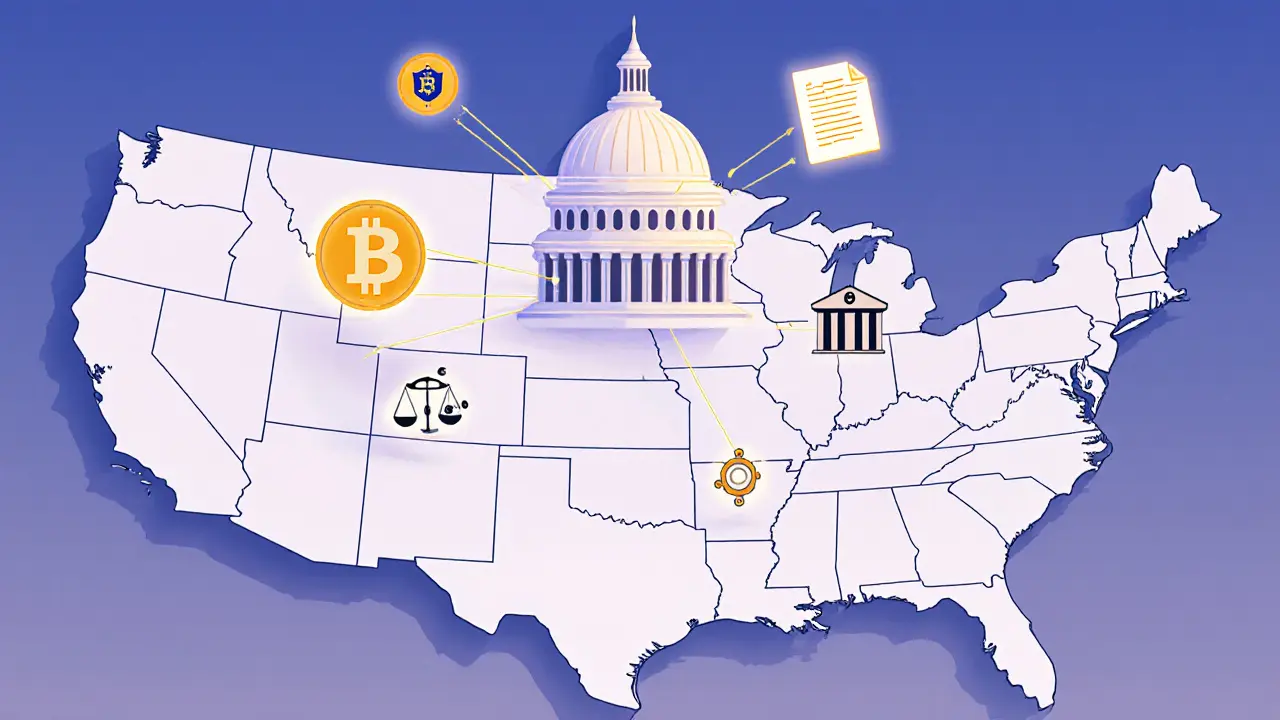Quick Summary
- Federal landscape: GENIUS Act (stablecoins), CLARITY Act (exchanges), SEC‑CFTC joint statement (spot products).
- New York: BitLicense via NYDFS - strict, high‑cost compliance.
- California: DFPI - permissive licensing, balanced oversight.
- Other states: mostly rely on existing money‑transmitter rules; a few have crypto‑specific statutes.
- Compliance checklist: federal filings, state licensing, AML/KYC, consumer‑protection disclosures.
United States cryptocurrency regulation is a layered system where federal agencies and individual states each set rules for digital assets. As of October 2025, there is still no single, all‑encompassing federal law, but a series of bills and executive actions are stitching the gaps together.
Federal Foundations Shaping State Actions
The latest federal moves are the backbone that many states reference when drafting their own policies.
GENIUS Act was signed into law in early 2025. It creates the first dedicated stablecoin framework, demanding full reserve backing and periodic audits for issuers. This act pushes states to consider whether stablecoin services fall under money‑transmitter laws or qualify for a separate licensing path.
The CLARITY Act, currently moving through the Senate, would shift oversight of crypto exchanges from the SEC to the CFTC, clarifying that futures‑style contracts and spot trading platforms are regulated as commodities markets. Although not law yet, the bill’s language is already influencing state regulators who are preparing for a commodity‑focused regime.
On September 2, 2025, the SEC and CFTC issued a Joint Statement saying that registered exchanges may list spot crypto assets, even with leverage or margin, as long as they meet existing securities or commodity rules. The statement removed years of ambiguity for platforms operating across state lines.
The Office of the Comptroller of the Currency (OCC) followed up with Interpretive Letter 1183, confirming that national banks can now provide custody, certain stablecoin services, and even join independent node‑verification networks without a separate supervisory non‑objection. This letter effectively opened the banking door for crypto‑related business models nationwide.
New York - The Gold Standard (or Gold Mine?)
New York’s Department of Financial Services (NYDFS) introduced the BitLicense in 2015, and it remains the most detailed state crypto regime.
Key requirements include:
- Pre‑approval of business plans, cybersecurity policies, and consumer‑protection procedures.
- Minimum capital reserves of $250,000 for most activities.
- Annual audits by an independent CPA firm.
- Ongoing reporting of transaction volumes and suspicious activity.
Enforcement is aggressive. The New York State Attorney General (NYAG) routinely files civil actions against unlicensed platforms, often resulting in hefty fines and restitution. For a crypto business, entering the New York market means budgeting for both the license fee (which can exceed $50,000) and the compliance staff needed to keep the license in good standing.
California - The Innovation Playground
California’s approach, led by the Department of Financial Protection and Innovation (DFPI), is intentionally lighter.
Instead of a mandated license, the DFPI uses a “narrow reading” of existing money‑transmitter statutes, only requiring a license when a business holds, transacts, or stores crypto on behalf of consumers. The agency also released a Crypto‑Friendly Regulatory Framework in 2024 that outlines best‑practice guidelines for AML/KYC, consumer disclosures, and smart‑contract auditing.
California still enforces consumer‑protection rules, but the process is faster and cheaper. A typical application fee is $1,500, and the DFPI often grants conditional approvals that allow startups to begin operations while they finish a full audit.

Other Notable States
While New York and California dominate the headlines, several other states have taken concrete steps.
| State | Licensing Body | Crypto‑Specific Law? | Key Feature |
|---|---|---|---|
| Texas | Texas Department of Banking | No (uses money‑transmitter rules) | Low fees, strong fintech hub |
| Florida | Florida Office of Financial Regulation | Yes (2023 Crypto‑Asset Act) | Requires cyber‑risk insurance |
| Illinois | Illinois Department of Financial and Professional Regulation | No | Relies on federal AML guidance |
| Washington | Washington Department of Financial Institutions | Yes (2024 Digital Asset Licensing Bill) | Allows “sandbox” testing for DeFi projects |
| Colorado | Colorado Division of Banking | No | Adopts a “regulatory‑cooperative” model with neighboring states |
Most other states have not passed dedicated crypto statutes. Instead, they apply traditional money‑transmitter, securities, or commodities regulations on a case‑by‑case basis, leaving businesses to interpret whether a token is a security, commodity, or currency.
Compliance Checklist for a Nationwide Roll‑Out
- Determine federal classification: Is the token a security, commodity, or stablecoin? Use the SEC‑CFTC joint statement as a baseline.
- Secure any required federal registrations (e.g., broker‑dealer, MSB) before tackling state licenses.
- Map target states and identify the appropriate regulator (NYDFS, DFPI, state banking department, etc.).
- Prepare core compliance documents:
- AML/KYC program aligned with FinCEN 2024 guidance.
- Cybersecurity framework (NIST 800‑53 baseline).
- Consumer‑disclosure template covering risks, fees, and insolvency procedures.
- File state applications:
- New York - BitLicense fee + detailed business plan.
- California - DFPI conditional approval, then full audit.
- Other states - Money‑transmitter license or exemption request.
- Set up ongoing reporting: transaction volume reports (SEC), periodic audits (NYDFS), and state‑specific filings.
- Establish a legal‑tech monitoring team to track bill progress (CLARITY Act, CBDC Anti‑Surveillance State Act) and adjust compliance accordingly.
Future Outlook: Toward a Unified Federal Framework?
The Trump administration’s executive order “Strengthening American Leadership in Digital Financial Technology” has put a clear signal on Capitol Hill: a cohesive federal framework is coming. The Working Group mandated by the order is due to deliver a report by early 2026, and it will likely propose a single crypto‑licensing regime that mirrors the CLARITY Act’s commodity‑centered model.
If Congress adopts the CLARITY Act and the GENIUS Act becomes the stablecoin backbone, states may shift from independent licensing to a federal pre‑approval system. That would dramatically lower compliance costs for companies operating in multiple states, but it could also reduce state revenue from licensing fees.
Until that legislation passes, businesses should treat each state as a unique jurisdiction while building a flexible compliance stack that can be toggled on or off depending on local requirements. Investing in a robust governance framework now pays off when the federal rules finally align.
Key Takeaways for Crypto Operators
- New York remains the most restrictive - plan for high costs and ongoing reporting.
- California offers the quickest entry point, but still expects strong consumer protections.
- Most other states rely on traditional money‑transmitter rules; treat them as extensions of federal AML/KYC obligations.
- Keep an eye on the CLARITY Act and the upcoming Working Group report - they will reshape licensing in 2026.
- Build a compliance engine that can adapt to both state‑specific and federal changes.

Frequently Asked Questions
Do I need a BitLicense to operate a crypto exchange in New York?
Yes. The NYDFS requires any platform that allows New York residents to buy, sell, or store digital assets to obtain a BitLicense, regardless of whether the token is classified as a security or a commodity.
Can I rely on the SEC‑CFTC joint statement to avoid state licensing?
No. The joint statement clarifies federal permissibility for spot products, but states may still impose their own licensing or registration requirements.
What is the main advantage of the GENIUS Act for stablecoin issuers?
It provides a clear, federal definition of a stablecoin and sets reserve‑backing and audit standards, easing the path to nationwide compliance.
How does California’s DFPI differ from New York’s NYDFS?
California uses a flexible, case‑by‑case approach that often treats crypto businesses under existing money‑transmitter laws, while New York mandates a stand‑alone BitLicense with extensive reporting.
Will the CLARITY Act replace state crypto regulations?
If enacted, the CLARITY Act would create a federal framework for exchanges and brokers, likely reducing the need for separate state licenses, but states could still enforce consumer‑protection rules.



 Finance
Finance





Lara Cocchetti
May 19, 2025 AT 06:08It feels like the whole crypto patchwork is a massive distraction, a smoke screen designed by the deep state to keep the real money flowing where they want it. Every new bill is another layer of bureaucracy, another way for the powers that be to insert backdoors into our financial freedom. The GENIUS Act, while sounding progressive, is just another instrument for the Fed to tighten its grip on the digital dollar. Meanwhile, the CLARITY Act is being whispered about in closed doors, hinting at a future where all exchanges are under a single, unaccountable overseer. New York’s BitLicense is a perfect example of how a state can act as a gatekeeper, charging fees that only the richest can afford, effectively silencing smaller innovators. California’s supposedly friendly approach still forces companies to bend under a different kind of pressure, monitoring every transaction like a surveillance state. The fact that most states still cling to antiquated money‑transmitter rules shows how the system resists true innovation. Even the OCC’s interpretive letters are just a way to legitimize bank involvement in crypto, ensuring that the traditional financial elites stay in control. The federal‑state tug‑of‑war is a clever ruse to keep the public confused and compliant. Each new regulation is framed as consumer protection, yet it centralizes power in the hands of a few regulatory bodies. The joint SEC‑CFTC statement may have cleared some fog, but it also gives the agencies a veneer of collaboration while they quietly consolidate authority. State licensing fees become a revenue stream for local governments, turning public safety into profit. The upcoming Working Group report is likely to cement a federal pre‑approval system, making state licenses redundant and further squeezing independent operators. The pattern is clear: a unified federal framework will soon replace the patchwork of state rules, and we will be left with a single, monolithic regulator. As citizens, we must stay vigilant and demand transparency, because every line of code in these laws is a potential lever for control. The future of crypto should be about decentralization, not about feeding another bureaucratic beast.
Linda Welch
May 24, 2025 AT 04:11Oh great another state adds a layer of red tape because apparently we all love paperwork and endless fees it’s amazing how every regulator thinks they’re the hero of the story and yet nobody actually gets any real progress done it’s like watching a reality show where the contestants are all lawyers and the prize is more regulation seriously the whole thing feels like a joke but the jokes keep getting longer and more expensive for the little guys who just want to build something useful.
meredith farmer
May 29, 2025 AT 02:14The drama of watching state after state try to out‑do each other in the regulatory Olympics is almost theatrical. New York flaunts its BitLicense like a trophy, while California pretends to be the cool kid on the block with its lax approach. Yet behind the scenes, both are just different flavors of the same control mechanism. It’s as if the regulators are staging a play where the audience never gets to see the script. The federal bills are the directors, pulling the strings, and we’re left to interpret the plot twists. The reality is that every new rule adds another act to an already convoluted saga. And while the audience (us) tries to keep up, the producers keep changing the stage lighting.
Krithika Natarajan
June 3, 2025 AT 00:18Thanks for breaking down the nuances; this really helps clarify the landscape.
Ayaz Mudarris
June 7, 2025 AT 22:21One must commend the authors of this guide for presenting a comprehensive overview of the current regulatory environment. The systematic delineation of federal statutes such as the GENIUS Act and the CLARITY Act, alongside the granular state‑by‑state analysis, provides an invaluable resource for practitioners. Moreover, the checklist format succinctly captures the essential compliance steps required for a nationwide deployment. The anticipation of forthcoming federal harmonization is particularly insightful, as it underscores the dynamic nature of this legal framework. Overall, the document exemplifies rigorous scholarship coupled with practical applicability.
Irene Tien MD MSc
June 12, 2025 AT 20:24Oh, look at the grand tapestry of regulatory theater, each thread woven by puppet masters who love a good conspiracy plot. The GENIUS Act, they say, is all about stability, but it’s really a clever way to lock stablecoins into a vault controlled by the very institutions that promised us freedom. And the CLARITY Act? A dazzling promise of clarity that, in reality, clears the path for big‑bank domination in crypto markets. New York’s BitLicense reads like a manifesto for the elite, demanding fees that would make a small startup weep into its coffee. Meanwhile, California pretends to be the progressive darling, but its conditional approvals are just a softer chokehold. The federal‑state dance is choreographed to keep us guessing, while the real agenda stays hidden behind legal jargon. Every state that adopts money‑transmitter rules is effectively saying, “We’ll let you operate, as long as you bow to the Federal Reserve’s whims.” The upcoming Working Group report will likely cement this power structure, delivering a single, monolithic licensing regime that looks neat on paper but smothers innovation. It’s a classic case of “regulation as revenue,” where each new fee line item pads state budgets. And while we’re busy checking boxes, the true custodians of our financial future-those anonymous architects-smile behind the curtains. The only salvation lies in relentless skepticism and a refusal to accept the narrative at face value.
Kevin Fellows
June 17, 2025 AT 18:28Wow, this guide is a solid roadmap-feel more confident diving into compliance now!
Alie Thompson
June 22, 2025 AT 16:31It is morally indefensible that a state can demand half a hundred thousand dollars just to grant a license, effectively gating the market against genuine competition. The BitLicense system in New York creates a barrier that only investors with deep pockets can cross, while smaller innovators are forced to either abandon their visions or operate in the shadows. Such a structure betrays the foundational principle that markets should be open and merit‑based. Moreover, the heavy reporting requirements place a disproportionate administrative burden on startups that simply lack the resources to maintain a full‑time compliance team. This is not merely a bureaucratic inconvenience; it is an ethical violation of fairness and equal opportunity. The state, in its pursuit of revenue, is complicit in stifling the very innovation that could drive economic growth and consumer benefit. The contrast with California’s more permissive stance highlights a deliberate choice of profit over principle. We must question whether these policies ultimately serve the public or simply enrich regulatory bodies and entrenched interests. The moral arc of our financial system should bend toward inclusivity, not exclusion.
Samuel Wilson
June 27, 2025 AT 14:34Excellent analysis. The juxtaposition of New York’s stringent requirements with California’s flexible approach underscores the diversity of regulatory philosophies across the nation. It is evident that a one‑size‑fits‑all strategy would be ineffective given the varied economic landscapes. Stakeholders would benefit from aligning their compliance frameworks with the specific expectations of each jurisdiction. Continued monitoring of legislative developments will be essential for long‑term success.
Rae Harris
July 2, 2025 AT 12:38From a contrarian perspective, one could argue that the proliferation of state‑specific crypto statutes merely adds useful heterogeneity to a market that would otherwise become monolithic. The jargon surrounding “money‑transmitter” and “commodity‑focused” regimes is, in fact, a reflection of diverse risk appetites. By embracing these differences, innovators can tailor solutions that fit niche regulatory ecosystems, thereby fostering specialization. Hence, the patchwork might be an asset rather than a liability.
Danny Locher
July 7, 2025 AT 10:41The compliance checklist is clear and actionable. It gives teams a solid starting point without overwhelming them.
Emily Pelton
July 12, 2025 AT 08:44Listen up, folks, the regulatory terrain is a minefield, but don’t panic, you’ve got this guide, and it’s packed with all the essentials, so grab a coffee, read through the state‑by‑state breakdown, pay special attention to the BitLicense minutiae, and remember, the key is flexibility, adapt your compliance engine, and you’ll navigate the chaos with confidence, trust the process, and keep your eyes on the upcoming federal harmonization, because that’s where the real game changer will be.
sandi khardani
July 17, 2025 AT 06:48The analysis presented here suffers from a classic case of selective myopia, where the author highlights only the most sensational aspects of the regulatory environment while ignoring the underlying economic rationales. By focusing exclusively on the burdensome nature of state licensing, the commentary dismisses the legitimate concerns that regulators aim to address, such as consumer protection and market integrity. Moreover, the insinuation that all new legislation is a covert power grab lacks empirical substantiation and borders on conspiratorial speculation. While it is true that compliance costs can be prohibitive for nascent firms, the narrative fails to acknowledge that many of these costs are offset by the stability and trust engendered through rigorous oversight. The piece also overlooks the competitive advantage that robust regulatory frameworks can provide to firms willing to meet higher standards, positioning them favorably in a market where trust is a scarce commodity. In sum, the article’s tone is more inflammatory than informative, and it would benefit from a balanced appraisal of both the advantages and disadvantages inherent in the evolving crypto regulatory landscape.
Christina Norberto
July 22, 2025 AT 04:51It is incumbent upon us, as custodians of economic liberty, to scrutinize the overtly centralized trajectory that the GENIUS and CLARITY statutes appear to embody. The systematic absorption of cryptocurrency oversight into a singular federal apparatus seems, at first glance, an elegant solution to a fragmented jurisdictional tableau. Yet, a more profound exegesis reveals an architecture designed to reassert hierarchical control over decentralized innovation. This consolidation may well be cloaked in the rhetoric of consumer protection, but the subtext indicates a strategic reallocation of sovereign authority. Philosophically, one must question whether the sacrifice of autonomous market mechanisms is a price worth paying for purported stability. The ensuing legal codex, with its elaborate audit mandates and capital reserves, could effectively ossify the dynamic equilibrium that defines the crypto ecosystem. Consequently, the broader implications for monetary sovereignty are both profound and disquieting. A vigilant discourse is essential to prevent the inadvertent creation of a digital oligarchy under the guise of regulatory clarity.
Fiona Chow
July 27, 2025 AT 02:54While the regulatory sprawl can feel overwhelming, it also invites a healthy dialogue about risk, innovation, and public interest. The contrast between New York’s rigorous demands and California’s more flexible stance is a reminder that no single model is universally optimal. It’s worthwhile to champion a balanced approach that safeguards consumers without stifling entrepreneurial spirit. Ultimately, fostering cooperation between states and the federal government could yield a more coherent framework that benefits all stakeholders.
Rebecca Stowe
August 1, 2025 AT 00:58Great summary-feeling optimistic about navigating the upcoming changes!
Aditya Raj Gontia
August 5, 2025 AT 23:01The guide’s jargon-heavy sections could be streamlined for quicker reference, but the core information remains solid.
Kailey Shelton
August 10, 2025 AT 21:04Very useful.